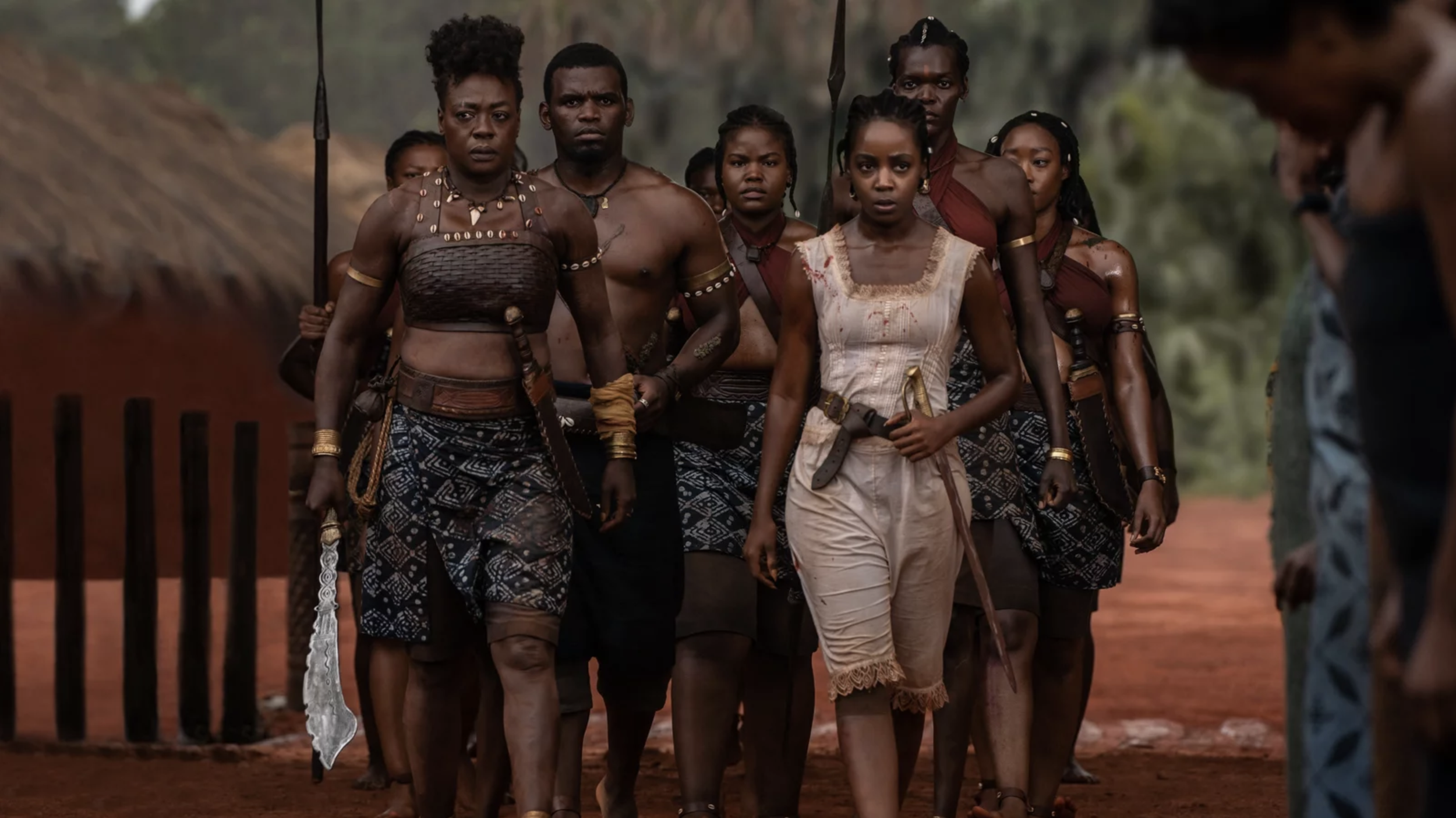THE WOMAN KING
Directing: A-
Acting: A-
Writing: B+
Cinematography: B+
Editing: A-
If The Woman King were about a bunch of European combat battles in the early 19th century, but made exactly the same way, I suspect I would be a little more guarded with my praise. Which is to say, as it is, The Woman King sure takes a Hollywood approach to its storytelling—its editing, its pacing, its themes, particularly its score. You could call this an “action movie” or a “war movie,” but three huge things set it apart and thus elevate it: it gives agency to people of color in the 19th century; it’s specifically about Black women warriors; and it’s set in Africa.
What’s more, the Agoji, the all-female military regiment depicted in this film actually exited—although this is where the “Hollywood” part comes in. The Agoji’s sacred status is very romanticized, in at least one case their vow of celibacy challenged by a possible suitor (these movies always need some element of romance). A chance re-encounter between a mother and separated daughter stretches the bounds of plausibility.
Nearly every beat of the story arc in The Woman King is recognizable. But, that hardly matters given the subject at hand, not to mention the performances of the actors, nearly all of them Black women, headed by Viola Davis, who genuinely deserves an Oscar nod for this role. Even among the Black characters, only a couple of them are men, including the Dahomey King Ghezo (John Boyega), and the leader of their African enemies, Oba Ade (Jimmy Odukoya). Other supporting parts include Hero Fiennes Tiffin as Santo Ferreira, a Portugese slave trader and the only White man in the film; and Jordan Bolger as Malik, Santo’s morally conflicted , half-Portuguese-half-Dahomey friend from childhood. There’s also, notably, a “eunuch” included in King Ghezo’s court of many wives.
All of these men are either villains, or secondary to the many Black women who take up the bulk of the narrative space in The Woman King. Lashana Lynch (previously seen, among other things, as Maria Rambeau in Captain Marvel) is excellent as an Agoji trainer, and Thuso Mbedu is well cast as Nawi, the film’s main protagonist in spite of Viola Davis being clearly the star. (Mdedu learns to be a badass. Davis already is one.) The same goes for Sheila Atim as Amenza, who is for lack of a better term, this community’s medicine woman. There are plenty more women warrior characters given just enough screen time and story relevance for us to care about them, until they are killed in battle. I don’t say that to be trite; this is about warriors, and their deaths should mean something,
Perhaps most importantly, The Woman King is riveting entertainment from start to finish. Its opening sequence is a banger, eschewing opening credits in favor of Viola Davis and her cohort of women warriors attacking a village that has some of their people hostage. A good deal of the backstory here has to do with how warring factions of African communities gained wealth by selling each other’s captives to slave traders.
There is no question that The Woman King oversimplifies an incredibly complex history of geopolitical issues, but this gets back to the whole “Hollywood” thing: that’s what movies do. Hopefully, it will spur viewers into reading up on the real people and histories. (There is already no shortage of think pieces to choose from, contextualizing this film online.) In the context of movies that use a proven crowd pleasing formula that works, it’s about time the industry tackled stories from what remains by far the most underrepresented continent in movies: Africa. The Woman King not only takes us to a place we rarely see in cinema, but takes the revolutionary step of taking on the perspectives of its indigenous peoples, rather than from the point of view of colonizers. That is what truly elevates this movie: the agency it gives characters we’ve never seen this way before—even with their own moral ambiguities and challenges.
I suspect this is something well understood by director Gina Prince-Bythewood (who also directed the 2020 Netflix movie The Old Guard). This is a unique story packaged in a formulaic way. I am usually exasperated by blatantly formulaic storytelling, but this is still something different. The Woman King is tailor-made for mass audiences, and only laziness or racism or sexism (or all three) will keep people from giving it a look. Whether it will make any real money in theaters in today’s dubious movie theater industry climate remains to be seen, but whether it’s there or on demand soon enough, this thrilling movie is essential viewing.
Behold the sacred warriors of the Dahomey.
Overall: B+

